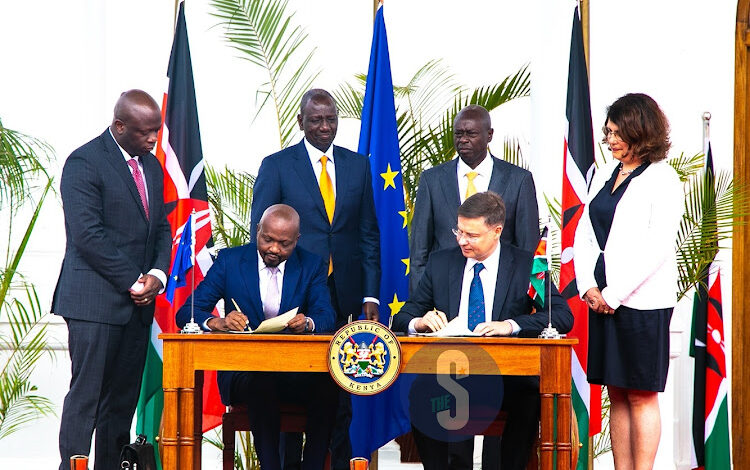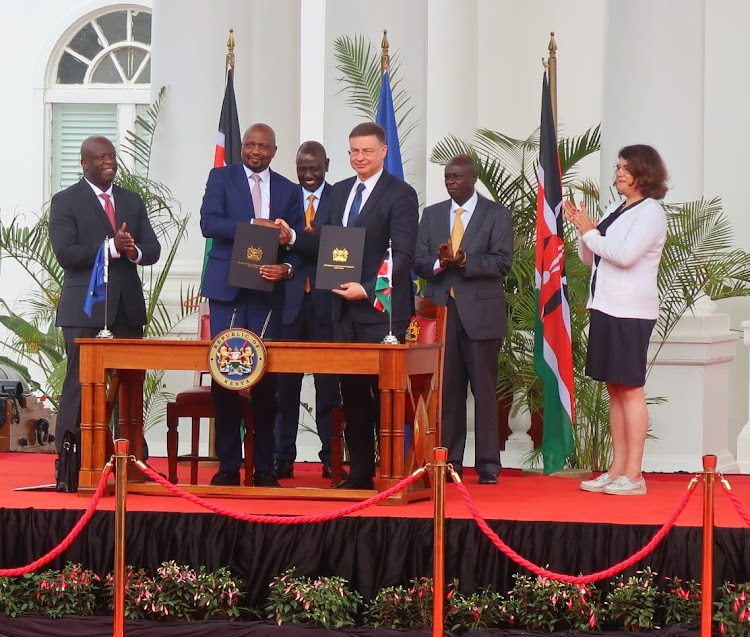
Faith Nyasuguta
Kenya and the European Union have finalized a significant trade agreement after a decade of negotiations, opening up Kenya’s domestic market to tax-free goods from the 27-country bloc for the next 25 years.
The EU-Kenya Economic Partnership Agreement (EPA), which preserves unrestricted access for Kenyan goods to the EU except for arms, came into force on Monday, as announced by Kenya’s Cabinet Secretary for Investment, Trade, and Industry, Rebecca Miano.
“The EU-Kenya EPA is one of the most ambitious agreements negotiated between the European Union and an African country in terms of promoting economic sustainability. It can serve as a template for other African countries, particularly those in Eastern Africa to adapt,” Ms. Miano said in a statement.
“The agreement includes trade, economic, and development cooperation, and a chapter on trade and sustainable development which covers provisions on labor issues, gender equality, forestry and environment, and the fight against climate change.”

This pact, marking the first trade agreement between the EU bloc and a developing country, ensures that Kenya’s largely agricultural produce such as vegetables, cut flowers, fruits, tea, and coffee will continue to enter the EU duty- and quota-free.
In return, Kenya has committed to gradually lower duties on imports from Europe over the next 25 years, eventually liberalizing trade. This means that goods from Europe such as machinery, mineral, and chemical products will not be subjected to duties, and investments from the EU will also be incentivized.
However, the EPA deal includes a protectionist clause that prevents the EU from applying blanket subsidies to agricultural exports to Kenya without a deepened policy dialogue with Nairobi. This clause is aimed at safeguarding Kenya’s agriculture and food security from unfair competition from the EU.
Trade between the two parties currently favors the EU, which sold goods worth Ksh223.12 billion ($1.7 billion) to Kenya, while importing Ksh150.08 billion ($1.2 billion) in return. The enforcement of the EU-Kenya EPA follows approval from the European Parliament on February 29, paving the way for heads of state and government to complete the ratification process.
The deal received 366 votes in favor, 86 against, and 56 abstentions from EU lawmakers. Kenyan lawmakers also approved the document, making it enforceable.
The agreement is largely a modification of the stalled EU-East African Community (EAC) pact, first agreed upon in October 2014, subject to approval by respective parliaments. The major change in the new agreement is the inclusion of clauses around climate change. Implementation of the EU-EAC treaty, which Kenya endorsed in 2016, had stalled due to resistance from other EAC countries. Rwanda signed but did not ratify, while Tanzania and Uganda refused to approve the pact over various economic and political concerns, including fears of European goods flooding their markets.
Unlike Kenya, which is a lower-middle-income country, the other EAC countries are protected from higher tariffs on exports under the “everything but arms” trade arrangement for least-developed countries, as provided by the World Trade Organization’s (WTO’s) Special and Differential Treatment (S&D) for LDCs. This refusal to cooperate led Nairobi to enter into a temporary special arrangement with the EU, allowing Kenya’s exports to continue accessing EU markets duty- and quota-free.

The EAC Heads of State Summit in February 2021 allowed partner members to sign bilateral trade deals on the condition that they leave room for other EAC countries to join in the future. Kenya and the EU have utilized this opportunity to re-engage on the pact, leaving the door open for other EAC member states to join when they choose to. This culminated in the signing of the new document last December, subject to ratification by respective parliaments.
This historic agreement between Kenya and the EU not only promises to boost trade and economic cooperation but also sets a precedent for future trade agreements between the EU and other African nations, aiming to promote sustainable development and economic growth across the continent.
RELATED:




